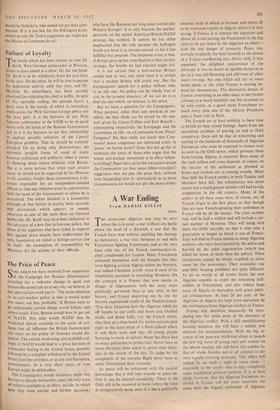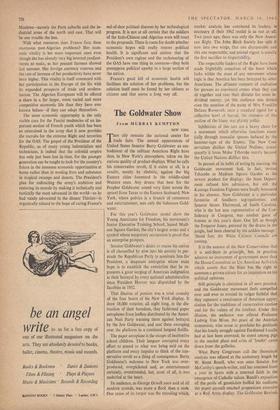A War Ending
From DARSIE GILLIE PARIS
ri" HE seven-year Algerian war may be over
when this is in print; a war without any battle above the level of a skirmish, a war that the French have won without anything but damage to themselves, a war that threatens to end with Frenchmen fighting Frenchmen, and at the very least with two of the French commanders-in- chief condemned for treason. Many Frenchmen sustained themselves with the thought that they were fighting to keep Algeria within the Western, and indeed Christian, world—even if most of its inhabitants persisted in remaining Moslems. On the contrary it is France that now stands in danger of Algerisation, with her army more politically perverted than at any time in her history, and France importing one by one the horrors experienced south of the Mediterranean. 'You have forgotten how the Algerian rebels let off bombs in our cafds and buses and football stadia and danse halls,' cry the French ultras; they then set a time bomb for twelve minutes past eight in the main street of a Paris suburb where it will blow arms and legs off young people hurrying to work or school. Never has Paris had so many policemen to protect her, Never have so many Parisians been asked to prove their ident- ities in the course of the day. To judge by the complaints of the extreme Right never have so many Frenchmen been tortured.
So peace will be welcomed with the painful knowledge that it will take months or years be- fore it can be enjoyed peacefully. There is the OAS still to be mastered at home where the virus is comparatively weak, even if it has a politically anaemic body in which to browse; and above all to be overcome rapidly in Algeria where it is very strong, if France is to honour her signature and above all avoid leaving the Frenchmen in the big cities to be put down by the Algerian ex-rebels- with the real danger of massacre. Peace, too, contains implicitly the final farewell to the dream of a France overflowing into Africa with, it was supposed, the delighted concurrence of the Africans. It was no doubt an ignoble dream in so far as it was self-flattering and oblivious of other men's wrongs, but one which did stir to some noble deeds as the cities France is leaving be- hind her demonstrate. The alternative dream of France continuing as an elder sister to her former colonies is a much healthier one but promises to be very costly, as a good many Frenchmen re- mark every time one of the African Presidents pays a State visit to Paris.
The French are at least unlikely to have time to brood on their mixed feelings. Apart from the immediate problem of putting an end to OAS conspiracy, there will be that of welcoming and settling in the hundreds of thousands of Algerian Europeans who must be expected to stream over as soon as the OAS terror, which prevents them from leaving Algeria, is removed. How many of the total million will come depends, of course, on the success of the settlement as planned at Evian and worked out in coming months. More than half the French settlers in both Tunisia and Morocco have left, but colonisation was more recent and a much greater number still had family connections in the old country. Many of the settlers in all three areas were, of course, not of French origin in the first place, so that though they are now French-speaking their settlement in France will be all the harder. The total number may well be half a million and will include a cer- tain number of Moslems. They will bring with them the OAS microbe, so that it may take a generation or longer to breed it out of France. They will find in France almost as many Algerian workers, who have been harried by the police and harried by the rebel organisation (which has killed far more of them than the police). These immigrants cannot be simply expelled to make room for the newcomers. Their economic role and their housing problems arc quite different. To do so would at all events invite the new Algerian republic to expel the remaining half- million of Frenchmen, and also reduce large areas of Algeria to starvation with grave politi- cal consequences. At least 20 per cent. of the Algerians in Algeria are kept from starvation by the remittances from Algerian workers in France.
France will therefore necessarily be intro- ducing into her midst some of the elements of the Algerian conflict. With a still unsatisfactory housing situation, she will have a sudden new demand for accommodation. With the big in- crease of her post-war birth-rate about to launch the first big wave of young men and women on the labour market, she will have this sudden in- flux of whole families not at all adapted to her own rapidly evolving economy. This influx will indeed be on such a scale in some areas — especially in the south--that it may completely upset established political patterns. It is at least likely, however, that the Algerian Europeans re- settled in France will not enter massively the areas with the biggest settlement of Algerian
Moslems—namely the Paris suburbs and the in- dustrial areas of the north and east. That will be one trouble the less.
With what resources does France face these enormous post-Algerian problems? Her econ- omic vitality is her most important asset even though she has already very big internal readjust- ments to make, as her peasant farmers showed last summer. Her foreign currency reserves and the rate of increase of her productivity have never been higher. This vitality is itself connected with her participation in the Europe of the Six with its expanded prospects of trade and modern- isation. The Algerian Europeans will be offered a share in a far larger, more varied and more competitive economic life than they have ever known before—if they can adapt themselves.
The same economic opportunity is the only visible cure for the Fascist tendencies of an im- portant section of French youth which has been so mistrained in the army that it now provides the recruits for the extreme Right and terrorists for the OAS. The gospel of the President of the Republic, as of many young industrialists and technicians, is indeed that the colonial empire has only just been lost in time, for the younger generation can be taught to look for the country's future in the immense economic opportunities at home rather than in wasting lives and substance in tropical swamps and deserts, The President's plan for redirecting the army's ambition and restoring its morale by making it technically and tactically the most advanced in the world—as he had vainly advocated in the distant Thirties—is organically related to the hope of curing France's oui-of-date political diseases by her technological progress. It is not at all certain that the soldiers of the Indo-Chinese and Algerian wars will react to the proposals. There is room for doubt whether economic hopes will really restore political health. It is significant and sinister that the President's own regime and the racketeering of the OAS have one thing in common—they both presuppose political apathy in a large section of the nation.
France's good bill of economic health will facilitate the solution of her problems, but the solution itself must be found by her citizens as citizens and that seems a long way off.



































 Previous page
Previous page